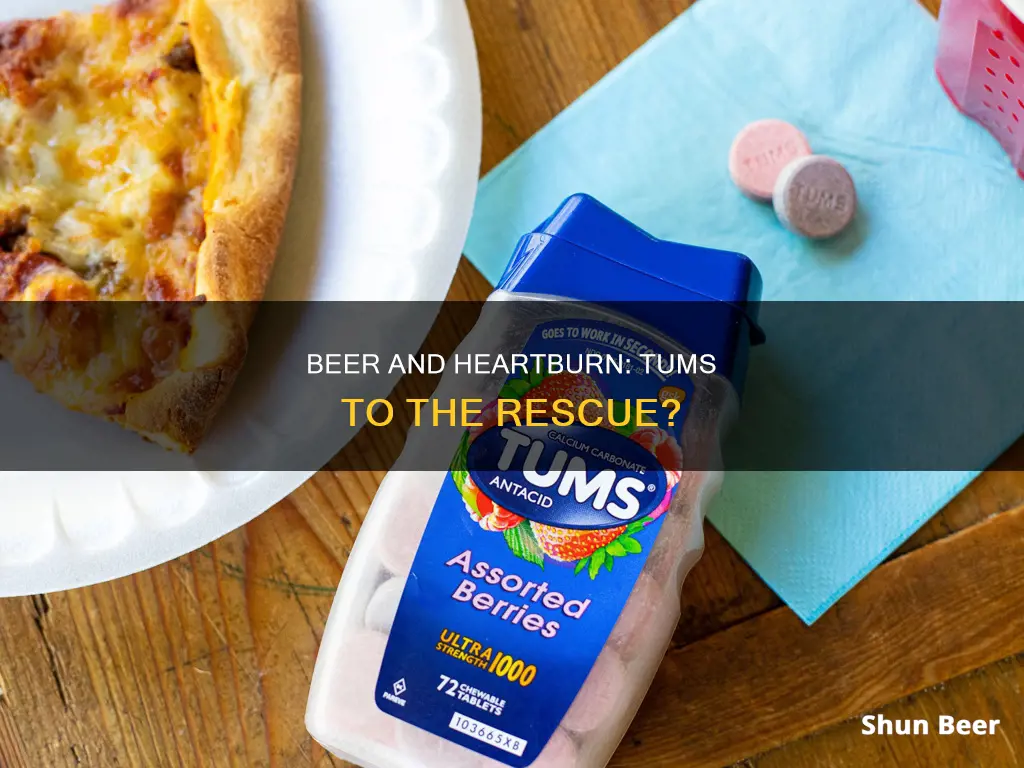
Tums is an over-the-counter antacid medication used to treat heartburn, acid reflux, and other symptoms of indigestion. It is generally safe to drink alcohol when taking Tums as there is no known interaction between the active ingredient in Tums, calcium carbonate, and alcohol. However, it is important to note that alcohol can worsen heartburn and indigestion symptoms by increasing gastric acid secretions and relaxing the lower esophageal sphincter, allowing acid to flow from the stomach into the esophagus. Therefore, while it may be safe to consume Tums after drinking beer, it is not recommended as alcohol is a common trigger of acid reflux.
| Characteristics | Values |
|---|---|
| Can you take Tums after drinking beer? | Yes, but it is not recommended as alcohol can worsen heartburn symptoms. |
| Is it safe? | Yes, there is no known interaction between Tums and alcohol. |
| What is Tums used for? | Tums is an over-the-counter antacid used to treat heartburn, acid reflux, and other symptoms of indigestion. |
| How does it work? | Tums contains calcium carbonate, which neutralises stomach acid and balances the pH level in the stomach. |
| What are the side effects of Tums? | Abdominal pain or cramps, diarrhoea or constipation, nausea and vomiting. |
| Precautions | Tums should not be taken to prevent heartburn caused by alcohol consumption. It is also not intended to treat hangovers. |
What You'll Learn

Tums can be taken after drinking beer to treat heartburn symptoms
The active ingredient in Tums is calcium carbonate, which has a high pH value and works by balancing the pH level in the stomach. Tums also contain several inactive ingredients, including food colouring, sodium polyphosphate, and flavouring.
While there is no known interaction between calcium carbonate and alcohol, alcohol can worsen heartburn symptoms. Alcohol can trigger or worsen heartburn by opening the lower esophageal sphincter (LES), allowing stomach acid to flow back up into the oesophagus. This can cause a burning sensation in the chest, known as heartburn. Therefore, while it is generally safe to drink alcohol when taking Tums, it is not recommended, especially if alcohol is a known trigger of your heartburn symptoms.
If you experience heartburn after drinking beer, Tums can be taken to relieve your symptoms. However, it is important to note that Tums only alleviates symptoms and does not address the root cause of heartburn. For this reason, it is ideal to avoid drinking alcohol before or after taking Tums, especially if alcohol is the main trigger of your acid reflux.
Viagra and Alcohol: Safe to Drink Beer?
You may want to see also

There is no known interaction between Tums and alcohol
Tums is an over-the-counter (OTC) antacid medication that helps to neutralise stomach acid and treat heartburn, acid reflux, and other symptoms of indigestion. The active ingredient in Tums is calcium carbonate, which has a high pH value. This compound neutralises excess stomach acid, providing relief to those who experience heartburn.
Additionally, alcohol can dehydrate the body, which is a crucial factor in hangover symptoms such as headaches and dizziness. It can also increase stomach acid secretions and irritate the stomach lining. Therefore, while Tums can be taken after drinking alcohol to relieve heartburn symptoms, it is not intended to treat heartburn caused by alcohol consumption. Tums only addresses the symptoms of heartburn and does not address the primary causes of hangovers, such as dehydration and low blood sugar.
It is worth noting that while Tums is generally safe for adults, side effects can occur, including abdominal pain or cramps and diarrhoea or constipation. These side effects usually go away once you stop taking Tums. However, if you experience severe or persistent side effects, it is recommended to consult a healthcare professional.
Beer Drinking: Everyday Habit or Unhealthy Vice?
You may want to see also

Alcohol can worsen heartburn and acid reflux
Alcohol can trigger or worsen heartburn and acid reflux. Alcohol is a common cause of heartburn, a painful, burning sensation in the chest and upper throat. This occurs when stomach acid flows back into the esophagus, or food pipe, causing pain and discomfort.
There are several ways in which alcohol can lead to heartburn and worsen acid reflux:
Irritation of the throat or stomach
The chemicals in alcohol can irritate the tissues in the esophagus, triggering heartburn.
Relaxing the lower esophageal sphincter
Alcohol relaxes the muscles around the stomach, including the lower esophageal sphincter (LES), a ring of muscle that blocks acid from flowing up from the stomach into the esophagus. When this muscle relaxes, it creates an opening for stomach acid to come back up into the esophagus, leading to acid reflux.
Increasing stomach acid production
Alcohol can cause the stomach to produce more acid. It can also make the tissues more sensitive to acid, increasing the likelihood of heartburn.
Affecting food choices
Alcohol can impair judgment, leading people to eat foods that disagree with them, eat late at night, or consume larger portions than usual. These factors can contribute to heartburn.
Drinking sugary or carbonated drinks
Alcoholic beverages that are sugary, citrusy, or carbonated can lead to heartburn.
Smoking
Alcohol consumption and smoking often go hand in hand. Smoking is a significant risk factor for heartburn and can further increase the risk of acid reflux.
Dehydration
Alcohol is a diuretic, which means it increases urine production and can lead to dehydration. Dehydration can worsen the symptoms of acid reflux.
To minimize the risk of alcohol-induced heartburn and acid reflux, it is recommended to drink in moderation, stay hydrated, avoid sugary and carbonated drinks, and refrain from smoking. Additionally, eating small meals, avoiding late-night snacks, and choosing distilled spirits over other alcoholic beverages may help reduce the likelihood of experiencing these symptoms.
Plant-Based Diet: Beer and Wine - Friend or Foe?
You may want to see also

Tums is not a cure for hangovers
Hangovers are complex and caused by a combination of factors, including dehydration, low blood sugar, the buildup of acetaldehyde, inflammation, and poor sleep quality. While Tums may provide temporary relief from acid reflux or heartburn during a hangover, it will not address other common symptoms such as fatigue or dizziness. Rehydration, for example, is crucial to alleviating hangover symptoms, and Tums does not help with this.
Additionally, Tums should not be taken to prevent a hangover. It has no role in preventing hangovers because it does not address the root causes, such as acetaldehyde toxicity, dehydration, or disrupted sleep. The best way to prevent a hangover is to drink less alcohol and at a slower pace, so your liver can metabolise it effectively.
It is important to note that common hangover remedies like greasy foods or "hair of the dog" (drinking more alcohol the next day) will also not cure a hangover. They may provide temporary comfort, but they do not address the physiological causes of hangovers. The best way to prevent adverse effects from alcohol is to reduce the amount of alcohol consumed.
If you are experiencing indigestion, heartburn, or any stomach upset, it is recommended to speak to your pharmacist or doctor for advice before taking any medication.
Drinking Beer After Donating Blood: What's Safe?
You may want to see also

Tums is not intended to treat heartburn caused by alcohol consumption
Tums is a popular over-the-counter antacid medication used to treat heartburn and acid reflux. It is also used to treat other symptoms of indigestion, such as an acidic or sour taste in the mouth, feeling full or bloated, and mild pain in the chest and stomach. The active ingredient in Tums is calcium carbonate, which neutralises excess stomach acid and relieves symptoms.
While Tums can be effective in treating heartburn, it is important to note that it does not address the root cause of the problem. Alcohol consumption is a common trigger of acid reflux, as it relaxes the lower oesophageal sphincter (LES), a ring of muscle that blocks acid from flowing up from the stomach into the oesophagus. When this muscle relaxes, it creates an opening for stomach acid to flow back up, causing a burning sensation in the chest known as heartburn.
Therefore, while Tums can be taken after drinking beer to relieve heartburn symptoms, it is not intended to treat heartburn caused by alcohol consumption. Combining the two is not recommended, as alcohol can worsen stomach acid imbalance and directly contribute to heartburn. Instead, it is generally advised to avoid alcohol consumption if you are experiencing heartburn, as it can aggravate the condition.
It is worth noting that there is no known interaction between Tums and alcohol. Tums can be taken before or after drinking alcohol, and there are no studies indicating a negative reaction between the two. However, it is important to remember that alcohol can worsen heartburn symptoms and contribute to indigestion.
Vegan Beer: What's in Your Pint Glass?
You may want to see also
Frequently asked questions
Yes, it is generally safe to take Tums after drinking beer. Tums is an over-the-counter antacid used to treat heartburn, acid reflux, and indigestion. While there is no known interaction between Tums and alcohol, alcohol can worsen heartburn symptoms by increasing gastric acid secretions and relaxing the lower esophageal sphincter. Therefore, it is not recommended to drink alcohol before or after taking Tums, especially if alcohol is the main trigger of your acid reflux.
Tums contain calcium carbonate, which helps neutralize stomach acid. Tums work by balancing the pH level in the stomach, reducing the amount of acid, and relieving symptoms such as heartburn, indigestion, and sour stomach.
Tums are generally safe for adults and children over 12 years old when taken as directed. However, side effects may include abdominal pain or cramps, diarrhea or constipation, and nausea or vomiting. If you experience severe or persistent side effects, consult your doctor or healthcare provider.
Tums may help with hangover heartburn, but it does not address the primary causes of hangovers, such as dehydration and low blood sugar. Tums only neutralize stomach acid and do not prevent or treat other hangover symptoms like fatigue, dizziness, nausea, or headache.







